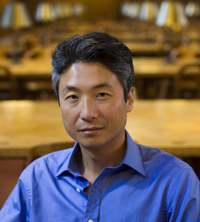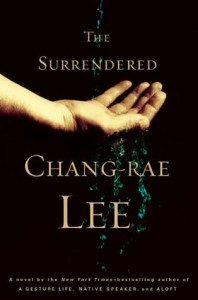Have you ever come across a book that made you feel like it took a piece of you with it?
The Surrendered was nominated for the 2011 Pulitzer Prize for Fiction but lost to Jennifer Egan’s A Visit From the Goon Squad. I decided to read the book because, like its author, Chang Rae Lee, my heritage is (part) Korean and I was roughly the same age as Lee when I emigrated to the US, and also because my grandfather was a survivor of the Korean War but withheld his harrowing war narratives from his children and grandchildren. I would like that to serve as a preface as I already came upon this book with a slight tilt.
This is the first novel of Lee’s that I’ve read as I plod along, continuing to read Pulitzer nominees and recipients. It’s clear both why this book was nominated, but also why this book did not win.
 The Surrendered, though by no means a perfect novel, left me feeling wrecked. When I finished the book, I felt like Chang Rae Lee had left me marooned in a tiny rowboat in the middle of eerily calm ocean. There are key plot points that are emotionally devastating but felt like they were never quite wrapped up. Regardless of a “sad” or “happy” ending (though how happy can the ending truly be in the context characters ravaged by war?), he never brings us readers back to shore.
The Surrendered, though by no means a perfect novel, left me feeling wrecked. When I finished the book, I felt like Chang Rae Lee had left me marooned in a tiny rowboat in the middle of eerily calm ocean. There are key plot points that are emotionally devastating but felt like they were never quite wrapped up. Regardless of a “sad” or “happy” ending (though how happy can the ending truly be in the context characters ravaged by war?), he never brings us readers back to shore.
The Surrendered is an indisputably beautifully-written book, the plot simmers and draws on elements of melodrama, and the characters are wrought with tragic flaws. It operates on self-aware unstilted prose that is able to discern and parse out figurative damage of war and somehow bring to life the ineffable inner conflicts experienced by the characters due to their traumatic pasts; there is no question that Lee has a gift for language. The novel suffers in that the plot has not been distilled enough, still weighed down by superfluous story trajectories, but the themes that uphold the spine of the novel are there.
The book is quite weighty and substantial so there are a wealth of different points to analyze, but I found myself latched onto the war orphans. Of the trio of protagonists, two are orphaned and left without family due to different war conflicts.
This may sound bold and quite contrary to the writing of other critics and various peer reviewers, but I found myself thinking that this book isn’t really about war. It’s set primarily during wartime, across different time periods, but war is a motif; the theme is the relationship between parents and children. Having read numerous analyses of the book, I was surprised that no one else had really reached for this idea yet.
The central characters in this novel are all tied together in that due to varying circumstances, they all lost the security and loving protection provided by parents. Their respective stories then unfold based on the consequences of what it means for an individual to be parentless (often figuratively). A majority of the rising action that culminates in the final tragic events take place at an orphanage, a place that hinges completely on the hopes of escaping “orphan” status and claiming parentage.
Both June and Sylvie are quite literally made orphans by the war. Their coping mechanisms differ in that June erects an emotional barrier to ward off and prevent any attempts at intimacy, while Sylvie turns to drugs that offer escape and a numbness that allows her to separate herself from her own pain.
Hector’s parental absence is mostly due to the fact that his father is incapable; we observe Hector often acting as the parent, attempting to guide his father through his alcoholism. He is more or less the parent while Jackie is the child. His longing to reclaim a weightless childhood free of consequences manifests itself in his inability to function as an adult. His interactions with women, too, are shepherded through this this desire to remedy a motherless upbringing. His relationship with the expendably forgettable character of Dora has the dynamic of a matronly caregiver.
Nicholas is also a character defined by his mother’s parenting (or lack thereof). Though I think many readers disliked the character of Nicholas, who never becomes an active presence in the book, I believe I may have been one of the few people who found him relatable. I thought he was well-realized, though is motivations seemed ambiguous.One must remember that Nicholas’s actions are told through June, who is still not quite aware enough to understand her own parenting style and its effects on her son. The depiction of his relationship with his mother was depicted so well based on simple actions of her observations of him shoplifting, as well as his characterization through of simply discarding things he successfully stole. Due to June’s frequent absence, he essentially also functions as his own parent. Mature enough not to spiral down and out into blatant self-destructiveness the way that Hector does, he gives June the illusion that all is well. Obviously it isn’t.
So how does one rectify failed parenting or orphanhood in the face of death? Tragic flaws manifest themselves in people who were forced to grow up without parental love and guidance, according to Lee. His novel explores those flaws in varying stages, but that’s where he leaves us. This is the saga of three doomed people in search of anchors. But this is where Lee left us (me); in a boat in a calm ocean, still drifting and searching for meaning.
I don’t detract from this book for the seemingly slapdash ending; I’m still trying to make sense of the novel in its entirety. However, I rate it highly because it made such an impression on me. Lee writes with an emotional force that I haven’t experienced in some time. I may seek to re-read this.
